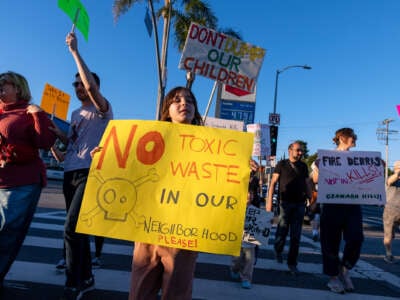A new study confirms what locals and environmental activists across the Gulf South and beyond have said for years: Black, Brown and Indigenous workers do not benefit equitably from jobs offered by the petrochemical industry despite their communities often bearing the brunt of its pollution.
In Louisiana, for example, residents and activists say jobs promised to Black communities located near refineries and chemical plants often go to white workers who commute from their homes a safer distance away from the toxic smokestacks, chemical fires, explosions, leaky pipelines and sky-high cancer rates that make the region notorious.
Published in the Ecological Economics journal by a team of environmental experts last month, the study examines employment at chemical and petroleum manufacturers nationwide. The researchers also conducted a case study of Louisiana’s petrochemical corridors, where local and state politicians lure industrial developers with lucrative tax breaks in the name of creating jobs and revenue.
The study cites years of research showing that the pollution and climate risks associated with the fossil fuel and petrochemical industry disproportionately fall on Black, Brown, Indigenous and poor white communities. Most of the wealth extracted from and created in these communities does not stay there, one reason why academics and activists call them fossil fuel “sacrifice zones.”
Researchers say the latest findings “reveal systemic inequality” in the petrochemical workforce across the United States. At plants that manufacture chemicals or products made from petroleum and other fossil fuels, people of color were “consistently underrepresented among the highest-paying jobs and overrepresented among the lowest-paying jobs in both subsectors,” the authors wrote.
For decades, Black residents of the Gulf South fighting against the expansion of refineries and chemicals plants near their historic neighborhoods — or virtually right on top of them — have been met with promises of jobs and other economic benefits. And for decades, residents have told visitors to Louisiana’s “Cancer Alley” and other industrial corridors that the jobs and benefits touted by petrochemical companies and supporters of their expansion rarely materialize after those corporate polluters receive permission from the government to set up shop.
Instead, residents are left to wonder about the long-term health impacts of pollution when they get sick or are forced to evacuate their homes due to a release of toxic chemicals from the plant, refinery or storage tanks located on the other side of the fence, according to Roishetta Ozane, a Louisiana-based organizer and founder of the Vessel Project, a mutual aid and environmental justice group.
“We are screaming at the top of our lungs about all the promises the industry makes to our communities that they don’t keep, and about those burdens that come from industry,” Ozane told Truthout in an interview. “We are constantly carrying those burdens.”
Ozane lives in the small town of Sulphur outside of Lake Charles in southwest Louisiana, where she counts 14 petrochemical facilities within miles of her house. Her family’s home is walking distance from a chemical plant that caught fire and produced a massive plume of toxic gas after Hurricane Laura made landfall in 2020, Ozane said.
“When we go by these facilities, the license plates on these vehicles are from Alabama, Georgia, Florida — wherever but from Louisiana,” Ozane said. “People don’t have the jobs here, but people do have cancer, and children do have asthma.”
Ozane says her community is already overburdened with pollution, but the fossil fuel industry is aggressively pushing to build new infrastructure in the region, including massive terminals for liquifying cheap fracked gas and exporting it overseas. Despite becoming the world’s top fossil gas producer, the price U.S. households pay for natural gas skyrocketed by 52 percent between 2016 and 2023. In Louisiana, enough methane gas was flared and leaked from existing infrastructure in 2019 to cover energy bills for two-thirds of households in the state. Methane pollution is a major contributor to global warming, which intensifies hurricanes and flooding in the Gulf South.
“We get the jobs that are most dangerous — temporary work, construction — and then those jobs go away and we’re back to figure out how to survive and thrive in this community that is now more polluted to begin with,” Ozane said, adding that workers worry about exposing their children to chemical residues.
Ozane said her community remains impoverished despite the vast industrial development, with a large portion of the population depending on food assistance and other safety net programs. Lake Charles has a poverty rate of 23 percent, more than twice the national average. People struggle to pay bills while also contending with health threats from petrochemical pollution.
“It’s critical that policy makers speak with frontline folks to get our perspective,” Ozane said. “People of color were significantly underrepresented in jobs at these oil refineries and chemical plants in particular here in Louisiana, which is a very racist place for lack of a better term. There are still state laws based on the Jim Crow era, so it’s nothing new to us.”
American Fuel & Petrochemical Manufacturers, a national trade association for the industry examined in the study on racial disparities in hiring, did not respond to a request for comment.
David Cresson, president of the Louisiana Chemical Industry Alliance, said the study does not consider the role of the chemical industry in workforce development in the state, including by supporting STEM programs for elementary and high school students, and working with universities and trade schools to provide scholarships and career paths toward high-paying science and engineering jobs in chemical manufacturing.
“We are committed to closing the training gap in Louisiana by investing in early education, STEM training and technical scholarships to ensure that all members of our communities are represented among our industrial workforce,” Cresson said in a statement to Truthout.
However, potential opportunities for students in the future offer little condolence to the people already living in the shadow of industry. In Cancer Alley, the petrochemical corridor along the Mississippi River located between New Orleans and Baton Rouge, residents of the rural, majority-Black communities in St. James Parish are fighting a historic legal battle in federal court.
St. James and the surrounding area is packed with the fossil fuel and petrochemical facilities that give Cancer Alley its name. Residents of majority-Black neighborhoods face increased risks of cancer, respiratory ailments and newborn health harms. After a multiyear fight to prevent a Taiwanese company from building another massive plant on land where the community’s ancestors were enslaved, worked and eventually buried after death, St. James residents sued the parish government, arguing that a land use policy slating residential areas for industrial development is unconstitutional and discriminatory.
Activists fighting environmental racism in St. James originally filed the lawsuit in 2023, seeking a moratorium on construction of new sources of pollution in their community. On April 9, the Fifth Circuit Court of Appeals ruled that advocacy groups representing residents of St. James can proceed with the lawsuit, a major victory after a series of legal setbacks.
“The pendulum of Justice has swung in our favor,” said Gail LeBoeuf, a St. James resident and organizer with Inclusive Louisiana, in a statement last month, after the ruling. “We have been sounding the alarm for far too long that a moratorium is needed to halt the expansion of any more polluting industries in our neighborhoods, and too many lives have been lost to cancer.”
Help Truthout resist the new McCarthyism
The Trump administration is cracking down on political dissent. Under pressure from an array of McCarthy-style tactics, academics, activists and nonprofits face significant threats for speaking out or organizing in resistance.
Truthout is appealing for your support to weather this storm of censorship. We fell short of our goals in our recent fundraiser, and we must ask for your help. Will you make a one-time or monthly donation?
As independent media with no corporate backing or billionaire ownership, Truthout is uniquely able to push back against the right-wing narrative and expose the shocking extent of political repression under the new McCarthyism. We’re committed to doing this work, but we’re also deeply vulnerable to Trump’s attacks.
Your support will help us continue our nonprofit movement journalism in the face of right-wing authoritarianism. Please make a tax-deductible donation today.
Read full article at source
Stay informed about this story by subscribing to our regular Newsletter

